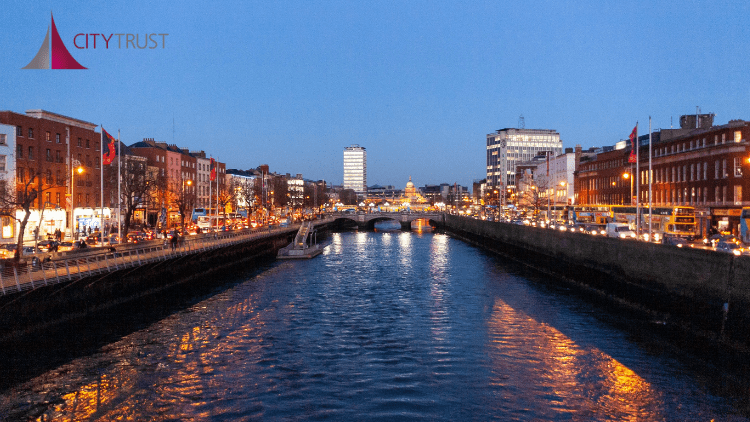Starting a Business in Ireland
There are many reasons why starting a business in Ireland is a smart decision. Ireland’s economy has shown consistent growth above the EU average. Ireland is one of the most favoured locations for business in Europe when you couple it with easy access to mainland Europe and the fact it’s the only English speaking country in the European Union.
Over the past three decades, Ireland has invited foreign direct investment from a wide range of businesses including established & well known International pharmaceuticals, electronics, engineering, financial services and computer software companies.
Economy
Ireland is a relatively small and contemporary economy with an average growth of 6%. At one point in time agriculture was Ireland’s most valuable sector but is now been eclipsed by industry and services.
Foreign multinationals dominate the export sector which remains a cornerstone of Ireland’s expenditure. The construction sector has always been a big driver of economic growth in Ireland along with strong business investment and consumer expenditure.
As a result of Ireland’s small size, the Irish economy is highly reliant on foreign trade. A population of 5 million caps the opportunity for industrial expansion in the domestic market. Ireland’s lack of natural resources means the necessity for the importation of fuels and other raw materials. Despite all of this, the value of exports has exceeded imports since the 80s and now exports account for approximately three-quarters of national output.
Ireland’s business mindset today is a result of decisions made in the mid-1950s to foster export-based industries to achieve economic expansion. Since then successive governments have nurtured these policies and have continually emphasised inward investment.
As mentioned already, Ireland is the only English speaking member of the EU and offers an enviable route to trading in the EU without exchange-rate risk. Simultaneously, this allows companies to take advantage of all the benefits it has to offer as a business location.
The Irish government’s promotional agencies have targeted specific areas of industry focusing on those who produce sophisticated high-value-added products and services. These industries offer the best growth potential and generate long-term sustainable employment. The targeted sectors are:
- Chemicals, BioPharmaceuticals & Pharmaceuticals
- E-commerce
- Information and communications technology
- Software
- Medical Devices
- Internationally traded services, financial services, call centres and shared services centres.
Other attractive sectors are;
- Construction
- Energy
- Environment
- Food and Drink
- Healthcare
- Transport
Ireland’s main export commodities are;
- Machinery & Equipment
- Computers
- Chemicals
- Pharmaceuticals
- Live Animals
- Animal products
Ireland’s main import commodities are;
- Data procession equipment
- Machinery and Equipment
- Chemicals
- Petroleum & petroleum products
- Textiles
- Clothing.
Government Incentives & Support
Ireland has used tax measures as a way of accommodating the creation and expansion of home-grown and foreign businesses. Ireland has a single low corporation tax rate of 12.5%. This rate applies to income from all business activity and provides opportunities for new foreign businesses that may not otherwise have the criteria for a low rate of tax.
There is state support available to inward investors which consist of tax incentives and financial aid in the way of grants. The availability and level of assistance by both EU and Irish legislation depend on the geographical location of the venture as well the activities that will be carried out in Ireland and the skill level of the people that will be employed.
The IDA is the top government agency responsible for the promotion of foreign direct investment into Ireland and the development of existing foreign companies. The IDA has an impressive portfolio of overseas companies which employ a large number of people directly in Ireland. Furthermore, the IDA can provide monetary assistance for new businesses including capital and grants for employment. They also provide capital for investment in R&D facilities and other training initiatives.
Labour, Workforce and Contract of Employment
Labour costs in Ireland are among the most competitive in the Western world. There is an efficient recruitment sector with agencies for specific sectors. The minimum wage currently is €10.50 per hour. Ireland has one of the longest working weeks in Europe (40 hours including overtime). They also have fewer bank holidays which makes it the longest working year.
There are 10 public holidays and when added to the average holidays of 20 days, gives total non-working days of 30. The European average is 36 days in comparison.
In Ireland, a contract of employment does not need to be written but is often the case. The employer must provide the employee with a written statement of the terms and conditions of employment. This must set out the minimum information as specified under the terms of the Employment Act.
Goods into Market, Advertising and Other Regulations
There are numerous ways to get goods into and around the Irish market. Ireland has three international airports located in Dublin, Cork and Shannon with additional regional airports in Donegal, Sligo, Knock, Galway, Kerry and Waterford giving Ireland a highly reliable distribution network.
Ireland has numerous Seaports. The major ones are Dublin, Cork, Rosslare and Waterford, all providing roll-on/roll-off facilities.
The road network in Ireland connects all major cities via motorway as does the rail network.
The traditional advertising outlets are Press, Television, Radio and outdoor with multiple national and regional brands. These advertising options go alongside online and digital advertising.
Other regulations to factor in are environmental issues to coincide with EU directives and the Environmental Protection Agency (EPA). The EPA is a governing body responsible for monitoring and licensing those industrial operations that are prone to environmental pollution.
Conclusion
Finally, if you’re interested in starting a business in Ireland. Get in touch with us today to speak with one of our company formation and substance services experts. Email enquiries@citytrust.ie or call +353 1 6753140.


